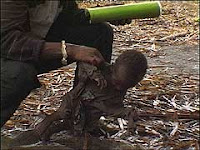
In an interview on the Darwin's Nightmare DVD ,director Hubert Sauper explains the power of the documentary:
We are so full of information ... but we don't have the right type of information in a way ...Darwin's Nightmare is an excellent, though highly disturbing documentary about how planes fly empty to Lake Victoria in Tanzania only to fly tonnes of fish, perch specifically, out every day for Europeans and Americans who can afford to buy them--this while the villagers in the same area starve. Only sometimes, Sauper reports, those same planes deliver weapons to supply the wars in the same area.
What does it mean 5 million dead in the Congo? It's just a number ... You say, OK that's a lot of people. It's far away. It's so many people that you can't imagine. In the east of the Congo is a war since 7 or 8 years that every day as many people die as on the 11th of September in New York. Every day. So September the 11th is happening every day in the east of the Congo. It's so beyond anything you can describe or imagine. ... Most people don't even know the number, but it's not enough to know the number. We need this other type of information which is very processed, which is communicated through art a lot.
Ironically, the art of cinema communicates things that we knew already, but we didn't quite understand, didn't have consciousness. There's this huge gap, this huge missing link between knowledge and understanding ... and real awareness. So cinema can make you aware of something that you knew for 25 years. And suddenly it totally strikes you. And suddenly you go, Jesus, this is something I should have known or this is something I never thought of, but I knew it already.
It's very necessary to have this other type of more subtle and more processed and more poetic information. I think you need the power of poetry to understand the tragedy of our time or the complexity of our time.
Sauper's earlier documentary Kisangani Diary also appears on the DVD and it includes some of the most devastating imagery of starvation I've ever seen. human beings who appear dead, buried in rubbish, who are only recognized as alive when they open their eyes or move their limbs ever so slightly, too weak to extricate themselves. Horrifically shrunken babies abandoned by their parents, Rwandese refugees who fled the avenging Tutsis.
One can only hope more people will see these documentaries and others like them, dark as their subject matter may be, in the hope that we humans will move collectively, as Sauper suggests, beyond casual knowledge into active understanding, into consciousness.
No comments:
Post a Comment